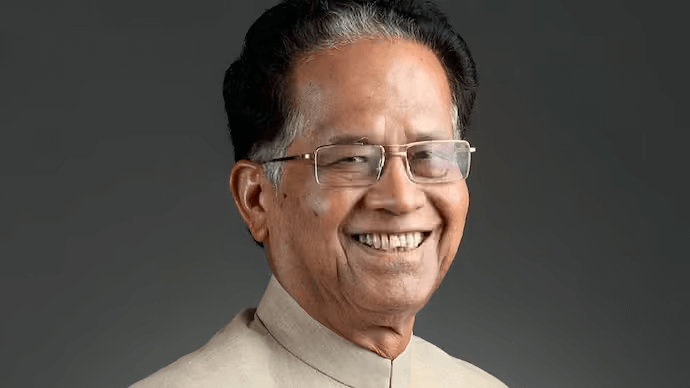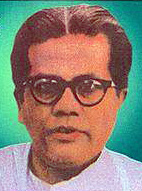Tarun Gogoi is remembered as the most successful Chief Minister of Assam, serving for an unprecedented three consecutive terms from 2001 to 2016. Born on April 1, 1936, in a traditional Ahom family in the Jorhat district, Tarun Gogoi was the son of Dr. Kamaleswar Gogoi and Usha Gogoi. He belonged to the Indian National Congress (INC) and represented Kaliabor in the Lok Sabha for six terms as a Member of Parliament, beginning in 1991.
Educational Journey and Early Career
Gogoi began his education at Jorhat Government Boys School, completed his Bachelor of Arts from Dibrugarh University, and pursued LLB from Guwahati University. After finishing his law degree, he practiced law with the Assam Bar Council. He also served as the Chairman of the Assam Small-Scale Industries Development Corporation, marking the start of his contribution to Assam’s economic growth.
Early Steps in Politics
In 1968, Tarun Gogoi entered politics by becoming a member of the Jorhat Municipal Board, showcasing his leadership abilities as a youth leader. His potential caught the attention of Prime Minister Indira Gandhi, who tasked him in 1971 with organizing the youth community in Assam. That same year, on September 30, 1971, he married Dolly Gogoi, and the couple had two children—a son, Gaurav Gogoi, who followed his father’s footsteps into politics, and a daughter.
Rise to National Prominence
Tarun Gogoi’s political career reached new heights in 1976 when he was appointed Joint Secretary of the All India Congress Committee (AICC) under Indira Gandhi. He played a key role in the aftermath of the Assam Accord of 1986, signed between the Central Government and the All Assam Students Union (AASU). Recognizing his skills, Rajiv Gandhi entrusted him with rebuilding the Congress in Assam during challenging times. From 1985 to 1990, he served as General Secretary of the AICC.
On a national level, Gogoi became a part of the Union Cabinet under Prime Minister P.V. Narasimha Rao, serving as the Union Minister of State for Food and Food Processing Industries.
Journey as Assam’s Chief Minister
In 1996, Gogoi took a pivotal step in state politics by becoming a Member of the Assam Legislative Assembly (MLA) from Margherita Constituency. His leadership led the Congress to victory in the 2001 Assam Assembly elections, and he became the Chief Minister of Assam, representing the Titabar constituency in Jorhat.
Gogoi went on to lead the Congress to three consecutive electoral victories (2001, 2006, and 2011). Under his leadership, Assam witnessed significant development in areas such as education, infrastructure, and economic growth.
Unique Contributions and Interests
Tarun Gogoi’s dedication to Assam extended beyond politics. He was closely associated with cultural and youth activities, serving as the Treasurer of All Assam Moina Parijat and Children’s Organizations. He was also the Ex-Chairman of Bharat Yuvak Samaj.
An enthusiast for gardening and reading, Gogoi enjoyed playing golf in his leisure time, making him a well-rounded leader who valued cultural and recreational activities.
Legacy and Family
Tarun Gogoi’s enduring legacy lies in his commitment to Assam’s development and his ability to bring stability and growth to the state during his tenure. His son, Gaurav Gogoi, continues his political journey, striving to uphold his father’s values.
Tarun Gogoi remains an inspirational figure for Assam, celebrated for his leadership, vision, and deep-rooted connection to the people of the state.
FAQ’s:
Q 1. Who was Tarun Gogoi, and why is he significant in Assam’s history?
Tarun Gogoi was a three-term Chief Minister of Assam and a prominent Congress leader known for his contributions to Assam’s development and political stability.
Q 2. What were Tarun Gogoi’s major achievements as Chief Minister of Assam?
Some of his achievements include improved infrastructure, boosting Assam’s economy, enhancing educational facilities, and maintaining peace and stability during his tenure.
Q 3. When and where was Tarun Gogoi born?
Tarun Gogoi was born on April 1, 1936, in Jorhat district, Assam.
Q 4. Which political party did Tarun Gogoi belong to?
Tarun Gogoi was a senior member of the Indian National Congress (INC).
Q 5. How many terms did Tarun Gogoi serve as Chief Minister of Assam?
He served three consecutive terms as the Chief Minister of Assam from 2001 to 2016.
Q 6. What role did Tarun Gogoi play in the Assam Accord and its aftermath?
After the Assam Accord of 1986, he was tasked by Rajiv Gandhi with rebuilding the Congress in Assam and played a key role in unifying the party during turbulent times.
Q 7. What positions did Tarun Gogoi hold in national politics?
Gogoi served as Union Minister of State for Food and Food Processing Industries under Prime Minister P.V. Narasimha Rao.
Q 8. What is Tarun Gogoi’s educational background?
He completed his Bachelor of Arts from Dibrugarh University and an LLB from Guwahati University before practicing law.
Q 9. What are some of Tarun Gogoi’s contributions outside of politics?
He was involved in cultural activities, serving as Treasurer of All Assam Moina Parijat and supporting youth and children’s organizations.
Q 10. Who is Gaurav Gogoi, and how is he related to Tarun Gogoi?
Gaurav Gogoi is Tarun Gogoi’s son, who is also a politician and a Member of Parliament representing the Kaliabor constituency.












